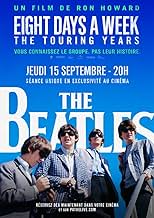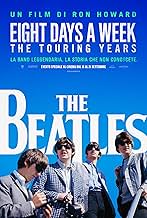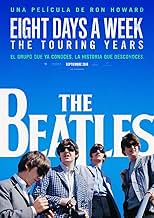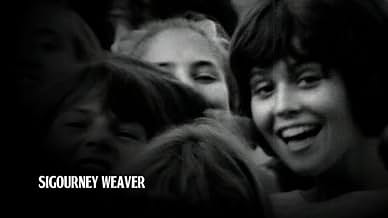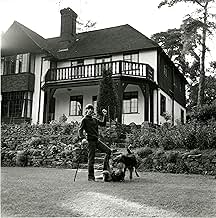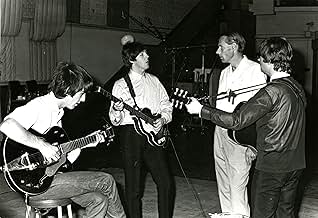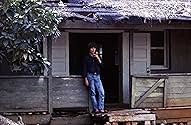Em 1966, os Beatles seguiram em turnê por 90 cidades em 15 países. O diretor Ron Howard revela os segredos desta turnê histórica a partir da perspectiva da própria banda, em uma análise do i... Ler tudoEm 1966, os Beatles seguiram em turnê por 90 cidades em 15 países. O diretor Ron Howard revela os segredos desta turnê histórica a partir da perspectiva da própria banda, em uma análise do impacto da Beatlemania na vida de cada membro.Em 1966, os Beatles seguiram em turnê por 90 cidades em 15 países. O diretor Ron Howard revela os segredos desta turnê histórica a partir da perspectiva da própria banda, em uma análise do impacto da Beatlemania na vida de cada membro.
- Ganhou 2 Primetime Emmys
- 5 vitórias e 14 indicações no total
- Themselves
- (cenas de arquivo)
- Self
- (cenas de arquivo)
- Self
- (cenas de arquivo)
- Self - BBC Radio Newsreader
- (cenas de arquivo)
- (narração)
- Self - BBC Radio Newsreader
- (cenas de arquivo)
- (narração)
- Self - WWDC Disc Jockey
- (cenas de arquivo)
- (narração)
- Self
- (cenas de arquivo)
- (narração)
- Self
- (cenas de arquivo)
- Self - Beatles touring manager 1962-1970
- (cenas de arquivo)
- Self - Beatles Manager
- (cenas de arquivo)
- Direção
- Roteiristas
- Elenco e equipe completos
- Produção, bilheteria e muito mais no IMDbPro
Avaliações em destaque
That being said, the revelations in this documentary are rather anodyne, compared with the startling revelations of the ABC TV (Australia) documentary "When The Beatles drove us wild", especially with regards to what band members got up to sexually during their tour of Australia in 1964, when the promoter lucked onto signing them for a bargain-basement price (just before they became a worldwide phenomenon). There are no stories of their sexual exploits in Howard's film and you wonder how the band could have survived if their debauchery in Australia (and elsewhere, no doubt), had been covered by the media. The ABC documentary suggested – from memory – that there was a kind of "understanding" between the band and the media in Australia not to cover those kinds of sexual activities.
What you do get in Howard's documentary is lots of photos and film of the band, including their time in previous bands, like The Quarrymen (which featured John Lennon, later joined by Paul McCartney and later still, George Harrison). There are also photos and film of The Beatles' early days in Hamburg and The Cavern. All the band members feature in current interviews or old interviews with those members who have died before the making of this documentary. The significant figures involved with the band are also featured (briefly) in interviews, people like their manager Brian Epstein and record producer George Martin ("The fifth Beatle").
Throughout the film, there are quite a few songs by the band which get played. Most of the time you don't hear the entire song, but it's long enough to be enjoyable. You also get to hear demo versions of songs or rehearsals or out-takes from recording sessions.
If you're obsessive about The Beatles, there might not be too much that is novel for you in this film but for the uninitiated there are lots of topics which get raised which the studious types can further research at their leisure. Personally speaking, some of the topics raised here I was already familiar with but may have forgotten about, meaning that I enjoyed being reminded about it. For instance, I was vaguely aware of some incident involving Imelda Marcos, the First Lady of the Philippines when The Beatles toured there. Other topics were new to me, like the protests arising from the band being booked to play at the Budokan stadium in Japan. Sometimes what I thought I knew was challenged. For instance, I thought that The Beatles' concert at Shea Stadium marked the end of their touring career because the crowd noise was so excessive that the band never wanted to have to deal with that again (the bonus feature at the end has reasonable sound quality for that concert). In the documentary, however, it's mentioned that their concert at Candlestick Park in the US was their last ever proper concert.
The landmark controversies do feature in this documentary, including the band's infamous "butcher cover" artwork for their single release "Yesterday and today" as well as John Lennon's notorious "bigger than Jesus" utterance which seemed capable of derailing their success...well, at least in their biggest market, the US.
An interesting aspect to this documentary is the focus on the many firsts that the band achieved, including being the first band to play stadiums (Shea Stadium), John Lennon accidentally inventing the use of backward played tape on albums, The Beatles being the first act to have the top 5 selling songs in the US singles chart and most noteworthy of all (and a surprise to me) was that The Beatles collectively overturned America's apartheid policy in the South to have non-segregated seating for their concerts there.
Lastly (as far as the documentary proper goes), it was interesting to hear that the band weren't always confident that they would be successful...they had their doubts, and John would go through a motivational chant to lift their spirits. Also, maybe it seems obvious, but I wasn't aware how autobiographical (and literal) Lennon's song "Help!" was. No other songs are discussed in this manner. I do have vague memories of a story on FM radio about their song "If I fell" (from memory) being autobiographical too...a song secretly intended to communicate with Lennon's lover, as he contemplated leaving his wife, I believe.
The only "complaint" I have of this documentary is that it would have been good to have revisited some clips from previous documentaries. E.g. there was one which featured Lennon talking to a fan, I believe, who was convinced that The Beatles had written a song about him...Lennon had to explain to him, like Jesus to a child, that that couldn't possibly be true (if I recall). One Australian documentary I saw had footage of one of their Australian concerts (Festival Hall, Melbourne?), where I heard an undiscovered gem of a song "It won't be long". Nothing like that in Howard's documentary. I do remember one "Parkinson" interview, I think, with Paul McCartney where he asked Paul about their songwriting influences. Paul mentioned their education, which was interesting...until Parkinson unfortunately changed the subject.
It was great to be reminded of the wit of the band in their press conferences...some funny comments from them.
Highlight:
A soccer crowd at Anfield spontaneously singing a Beatles song during a game.
Liked/interesting:
Footage of Ringo really hammering the drums enthusiastically.
The band were mostly stoned when shooting their film "Help!".
Their record deal was lousy.
Couple of comments: this documentary is directed by none other than Ron Howard, with the full cooperation of Paul, Ringo and the Lennon and Harrison estates. Howard and his team must have roamed the earth to come up with all of the fantastic footage, and make some pointed comments along the way (the Beatles had a contractual provision prohibiting segregated shows in the South, a remarkable stand considering the circumstances). The sound quality has been painstakingly remastered as best as possible. As a lifelong Beatles fan who was too young to have seen them in person or fully appreciate what all took place half a century ago, this movie is sheer delight from start to finish. The theater version came with a 30 min. bonus feature immediately after the end titles, namely "The Beatles At Shea Stadium", their entire set from August 15, 1965. It absolutely blows the mind what happened there. And to think that as the headliner, the Beatles played for all of 25 minutes! Watching the crowd is as much fun as it is watching the guys. Here again, the old footage has been restored and remastered.
"Eight Days a Week - The Touring Years" opened this weekend on a single screen for all of Greater Cincinnati, at my local art-house theater. I couldn't wait to see it. The Saturday matinée screening where I saw this at was PACKED to the rafters, to my surprise and delight. On my way out of the theater, there was already a long line waiting for the next screening. It seems this movie is hitting a nerve, and this has the looks to be a solid success on the art-house theater circuit. If you love the Beatles, you do not want to miss this. "Eight Days a Week - The Touring Years" is HIGHLY RECOMMENDED!
The documentary is very entertaining and shows us a lot of new Beatles footage that was of course fantastic to see. It had some great contributions from famous people such as Whoopi Goldberg and the surviving Beatles Paul McCartney and Ringo Starr, which were nice too see but I think a little more variety of celebrities would have been nice.
The film shows a side of The Beatles that nobody usually sees. It shows them as just kids who were out of their depth, which was great because it really brings them down to our level. It was very interesting to see that in a way the fans killed The Beatles and that they thought the music was getting lost in the hysteria.
It only touches on the controversy surrounding them a little, which is a shame because it was very interesting to learn about.
You come out with a new view of them as people and not as a brand. It does a good job at humanising them, which I applaud it for doing as it will inspire others to peruse their dreams.
There's something magical about seeing these people together even on film because the chemistry they have is so strong and the music is phenomenal. Hearing the music again was great. Especially when it's remastered.
There's also a really cool bit involving Sigourney Weaver. It really shows how big The Beatles were.
They reused some of the footage a bit too often and it can get a bit irritating over time.
I would definitely recommend it to a fan of The Beatles, it's good to learn about them. If you aren't a fan then you won't like it. It's well crafted with only a little problem here and there. Overall, it's good and I would recommend it to a Beatles fan.
I have to admit I always thought the Beatles were a bit too poppy and overrated, how wrong I was!!
Until watching this, I totally under appreciated the cultural impact The Beatles had around the world, and sheer volume of quality work they put out, of varying styles and influence...especially when they experimented more later in their career.
They did all this whilst facing a lot of pressure while under the media spotlight, and we're able to remain honest, fun, and true to themselves without selling out.
I would have liked to see a little more on the bands history once they had stopped touring in 1966, but nevertheless the focus on the Beatlemania period is really well done, and worth a watch for any music fan, regardless of genre!
Você sabia?
- CuriosidadesThe title of the titular song was a result of happenstance for which Paul McCartney claims credit. McCartney had been banned from driving for a speeding violation, and while travelling to John Lennon's home in a chauffeur-driven car one day, he idly asked the driver if he'd been working hard. The driver responded dryly, "Eight days a week".
- Erros de gravaçãoIn the theatre special concert from Shea Stadium, George very visibly switches to his 12-string Rickenbacker guitar for "A Hard Day's Night", but during the song, there are a few shots of him suddenly playing his Gretsch instead.
- Citações
Reporter: What about the reports that you guys are nothing but a bunch of British Elvis Presleys?
Ringo Starr: [while shaking his body] It's not true. It's not true!
[the Beatles and reporters laugh]
- ConexõesFeatures Toast of the Town (1948)
Principais escolhas
- How long is The Beatles: Eight Days a Week - The Touring Years?Fornecido pela Alexa
Detalhes
- Data de lançamento
- Países de origem
- Centrais de atendimento oficiais
- Idioma
- Também conhecido como
- 一週八天的歲月:披頭時代
- Empresas de produção
- Consulte mais créditos da empresa na IMDbPro
Bilheteria
- Faturamento bruto nos EUA e Canadá
- US$ 2.930.414
- Fim de semana de estreia nos EUA e Canadá
- US$ 785.336
- 18 de set. de 2016
- Faturamento bruto mundial
- US$ 13.737.240
- Tempo de duração
- 1 h 46 min(106 min)
- Cor
- Proporção
- 1.78 : 1






